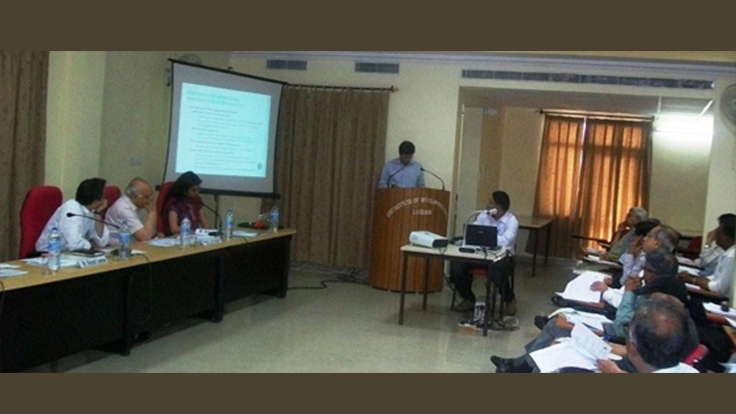Details of Discussion
Agriculture
A participant pointed out that agriculture in UP was top-heavy and more people were required at the grassroots level as also in the research and extension systems. It was mentioned that seeds replacement was low and that there was shortage of both skilled and unskilled labor. In addition to water issues, this was adversely impacting productivity. Many farmers were giving up rice cultivation. It was felt that without technological support, storage capacity and primary level processing capacity at the grass roots, the farming sector was not going to improve.
Another participant talked about support to animal husbandry and the need to protect the gene pool of healthy livestock. This gene pool was gradually eroding and creating a shortage of healthy dairy animals and other livestock. It was also suggested that traditional time-tested farming techniques such as the preservation and reuse of local seeds by small farmers should be left alone and not destroyed by new systems that are detrimental to this practice. There was general agreement that infrastructure and technology related to agriculture, supported by locally available inputs (seeds, machinery) were critical for improvement of the farm sector in UP. It was also suggested that for mass adoption of any technology, entrepreneurship development at the local level was imperative. In addition, it was pointed out that monsoon rainfall had become more erratic, and early droughts were more frequent. There was therefore a need for climate-responsive technology in agriculture.
A participant suggested that agriculture and industry should be made to complement each other and both these sectors should boost the services sector.
Health
Participants pointed out that UP's social infrastructure was poor. Health indicators like the birth rate, MMR, IMR, etc. were all higher than the national average. The percentage of population with access to formal health care was also very low. Moreover, 80 percent of health expenditures came from the private sector; public sector investment was handicapped by poor management and leakage. Rural UP in particular faced huge problems in health and sanitation. This impacted the quality of the state's human resources. Regional and sectoral imbalances in UP could not be corrected until investment in the social sectors was substantially improved. ICDS IV had not really taken off, and malnutrition among women and children in particular continued. Inadequate human resources in health services were an important contributor to poor health care facilities.
One participant stated that mental health had not been given enough focus and this problem had to be recognized.
Education and Vocational Training
A participant observed that while investment in education was rising, the quality of education showed no commensurate improvement. It was stated that Sarva Shiksha Abhiyan (SSA) had given greater weightage to the numbers enrolled rather than the quality of education provided. The number of out-of -school children was also a serious concern.
The speaker asked whether the Bank would be interested in supporting higher education, perhaps as a demonstration project on a small scale. For instance, the Bank could adopt one or two universities and transform them into world class institutions.
A participant pointed out that the biggest problem with education was that it did not promote entrepreneurship. The state desperately required vocational education and skills training for the youth. It was pointed out that there were 1.5 lakh engineering seats but only 25,000 ITI and 35,000 polytechnic seats; this distorted the actual market needs, considering the employment potential and trends in industry. Skills training was particularly necessary as the Micro, Small and Medium Enterprises (MSME) sector in UP had a huge potential for growth and employment generation. It was suggested that, given its potential, the MSME sector could be served by dedicated financial systems and institutions which could provide expertise along with financial support. It was also observed that the World Bank could act as a catalyst and counselor for this sector in particular, and for industrial development in general in the state.
Governance and Corruption Issues
Several speakers articulated their concerns on this and referred to the level of corruption in the state and its notoriety as a 'leakage state'. One participant stated that "development had become synonymous with corruption", and thus it was not certain whether investment would be put to efficient use. A new mechanism for the oversight of funds flow in projects involving the government, NGOs and social activists could be considered. It was felt that governance and transparency would not improve without an educated public with capacity for oversight and concerted action. The example was given of the murder of a whistleblower who had exposed corruption in a road project. Inquiries into the case remained inconclusive.
It was suggested that capacity building at the grass roots, particularly strengthening of the PRI institutions, was an essential input to boosting good governance. A further suggestion made was on the use of Information Technology and a strong grievance redressal mechanism to boost transparency and tackle governance issues. Laws like the RTI also had to be better implemented in the state. There was general consensus that it was imperative to fight corruption, improve work culture and the law and order situation in the state.

